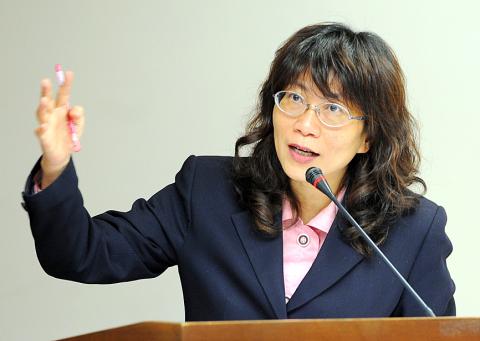The Council of Labor Affairs is mulling heavier punishments for employers or managers who are found responsible for the death of an employee from overwork, council Minister Jennifer Wang (王如玄) said yesterday.
She made the announcement while answering questions from lawmakers and reporters at a meeting of the legislature’s Social Welfare and Environmental Hygiene Committee.
Following a series of widely reported cases of death from overwork, especially in high-technology industries, labor groups have in recent months called for tighter regulations to protect workers from being worked to death.

Photo: Wang Min-wei, Taipei Times
They have also lobbied for harsher penalties against employers who have directly or indirectly contributed to excessive overtime work, resulting in health issues or even death for the employees.
“The council is in discussion with labor and legal experts to explore the possibility of imposing criminal liability for employers who have contributed to workers’ death from overwork, in addition to heavier monetary penalties,” Wang said.
However, because three rulings must be passed before a defendant may be found guilty of a criminal offense, it could take years before justice is served to victimized employees, so this may not be the most efficient way to take care of such matters, she said.
The council said last week it planned to revise the law to increase the fines to NT$200,000 for businesses abusing “the system of job responsibility” and ignoring the health of their employees.
In its present form, the Labor Standards Act (勞動基準法) stipulates a maximum fine of NT$60,000 for employers who abuse the system.
Critics ask why an employee’s health could be worth so little, especially in light of the recent deaths blamed on overwork.
The latest council statistics show the average Taiwanese worker put in 2,156 hours on the job in 2008, or about 41 hours per week, which is about 20 percent more than workers in Japan and 50 percent more than those in Germany.
Wang also said the Act contained loopholes such as Article 84-1, which states that workers in certain industries “may arrange their own working hours, regular days off, national holidays and female workers’ night work through other agreements with their employers.”
The article has been widely criticized as providing a legal way for private security firms to exploit their guards, since such jobs are categorized as “monitoring or intermittent jobs” and therefore fall into this category.

An essay competition jointly organized by a local writing society and a publisher affiliated with the Chinese Communist Party (CCP) might have contravened the Act Governing Relations Between the People of the Taiwan Area and the Mainland Area (臺灣地區與大陸地區人民關係條例), the Mainland Affairs Council (MAC) said on Thursday. “In this case, the partner organization is clearly an agency under the CCP’s Fujian Provincial Committee,” MAC Deputy Minister and spokesperson Liang Wen-chieh (梁文傑) said at a news briefing in Taipei. “It also involves bringing Taiwanese students to China with all-expenses-paid arrangements to attend award ceremonies and camps,” Liang said. Those two “characteristics” are typically sufficient

A magnitude 5.9 earthquake that struck about 33km off the coast of Hualien City was the "main shock" in a series of quakes in the area, with aftershocks expected over the next three days, the Central Weather Administration (CWA) said yesterday. Prior to the magnitude 5.9 quake shaking most of Taiwan at 6:53pm yesterday, six other earthquakes stronger than a magnitude of 4, starting with a magnitude 5.5 quake at 6:09pm, occurred in the area. CWA Seismological Center Director Wu Chien-fu (吳健富) confirmed that the quakes were all part of the same series and that the magnitude 5.5 temblor was

The brilliant blue waters, thick foliage and bucolic atmosphere on this seemingly idyllic archipelago deep in the Pacific Ocean belie the key role it now plays in a titanic geopolitical struggle. Palau is again on the front line as China, and the US and its allies prepare their forces in an intensifying contest for control over the Asia-Pacific region. The democratic nation of just 17,000 people hosts US-controlled airstrips and soon-to-be-completed radar installations that the US military describes as “critical” to monitoring vast swathes of water and airspace. It is also a key piece of the second island chain, a string of

The Central Weather Administration has issued a heat alert for southeastern Taiwan, warning of temperatures as high as 36°C today, while alerting some coastal areas of strong winds later in the day. Kaohsiung’s Neimen District (內門) and Pingtung County’s Neipu Township (內埔) are under an orange heat alert, which warns of temperatures as high as 36°C for three consecutive days, the CWA said, citing southwest winds. The heat would also extend to Tainan’s Nansi (楠西) and Yujing (玉井) districts, as well as Pingtung’s Gaoshu (高樹), Yanpu (鹽埔) and Majia (瑪家) townships, it said, forecasting highs of up to 36°C in those areas